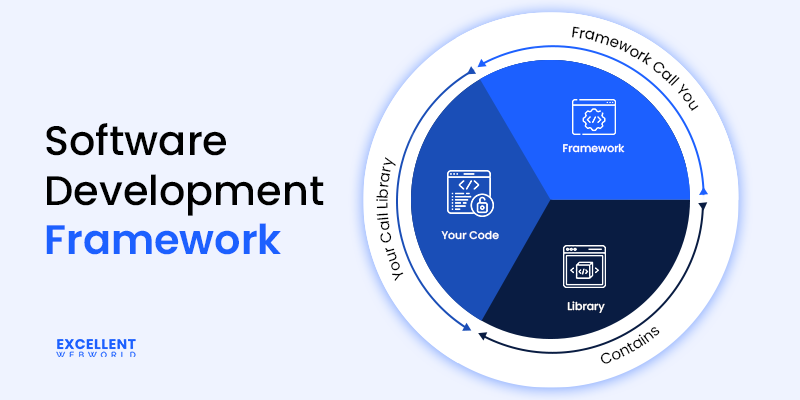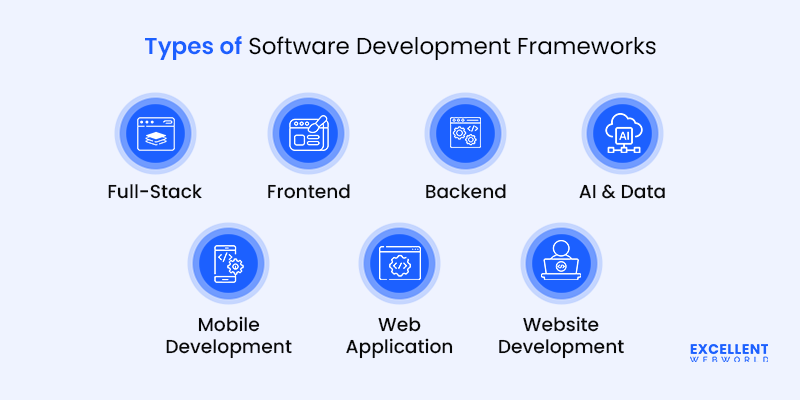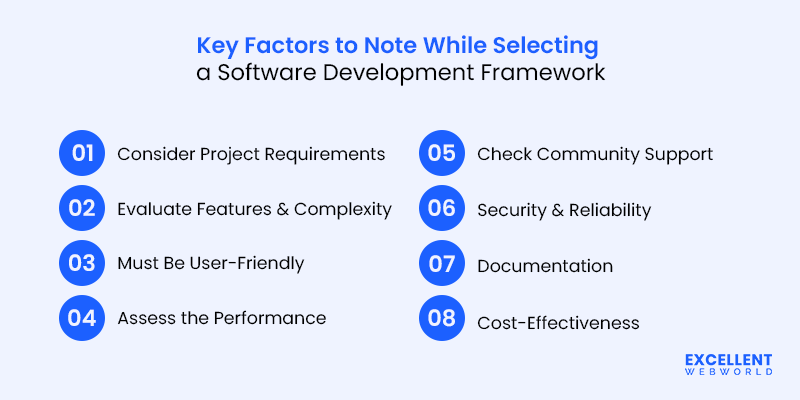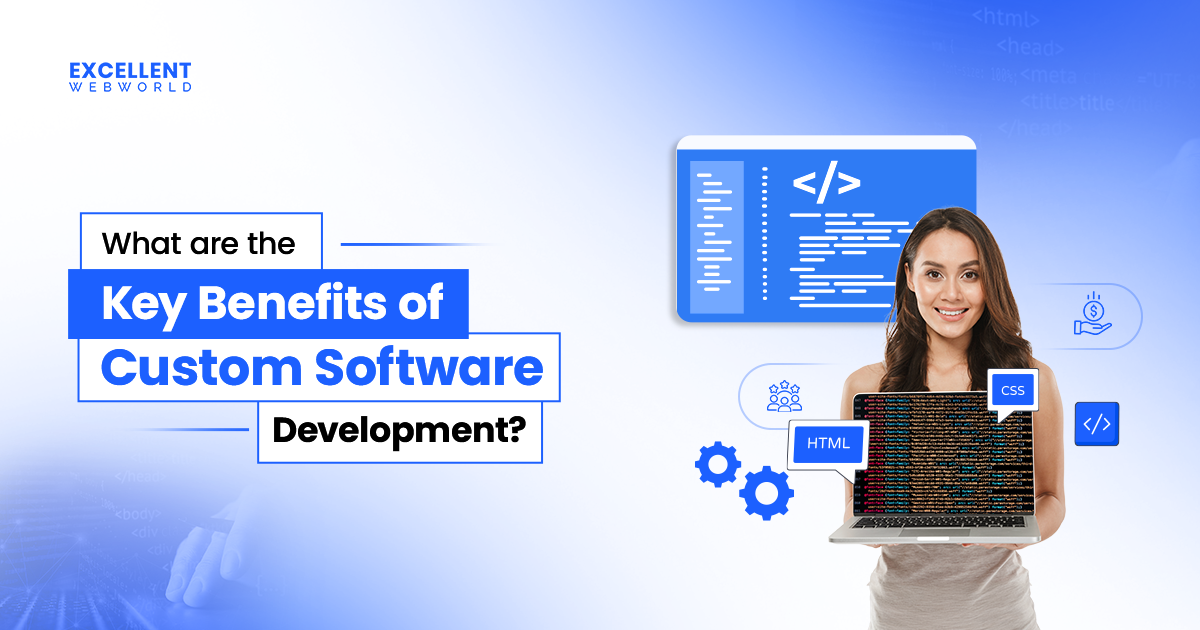The software development process has completely changed in this AI-first world. It is evolving and driven by AI-first architecture, cross-platform expectations, and demand for faster, smarter builds. Ultimately, it makes choosing the right software development framework crucial.
Developers are not just writing any code; they are working on building ecosystems with frameworks that support scalability and security. Because software development frameworks are not just tools, they are strategic enablers that power your solution.
At Excellent Webworld, as a software development consultant, we have spent 13+ years building high-performance software for different industries. We have delivered 900+ solutions globally, and adopted advanced frameworks to develop future-proof software. Consulting with these experts, we have curated a list of software frameworks and why they matter more than ever before.
What is a Software Development Framework?
A software development framework is a structured approach to building software. It helps determine how to deploy, connect, and operate different components. Software frameworks are pre-built foundations of tools, libraries, and best practices that make developers craft applications more efficiently.

The software engineering frameworks mostly include templates, code libraries, APIs, and support for debugging and testing, which makes development faster, organized, and scalable. Whether you want to create a mobile app, web app, or enterprise system, choosing the right framework for software development matters to ensure agility, innovation, and long-term success.
What Are The Different Types of Software Development Frameworks?
Software development frameworks are categorized based on what part of an application or website they help to build. From web apps to AI-powered systems, each type of software framework serves a unique purpose. Let’s break it down here:

1. Frontend Frameworks
The frontend software development framework focuses on the visual and interactive part of the software application that is made for users and is responsible for engaging them with screens.
2. Backend Frameworks
The backend development software engineering framework type is used to develop a server-side logic that powers the frontend to handle integrated AI and other APIs, databases, authentication, and performance.
3. Full-Stack Frameworks
These full-stack development frameworks in software engineering combine frontend and backend capabilities, which allows developers to craft complete application features and functionality with a unified stack.
4. Mobile Development Frameworks
As the name suggests, the mobile development frameworks are designed for building native or cross-platform mobile apps, mostly by writing a single codebase. Hybrid app frameworks that allow for the development of an app for multiple platforms with a single code also come under the category of mobile frameworks.
5. Web Application Frameworks
These types of web app frameworks help you develop dynamic and interactive web app solutions that can manage logic, user inputs, and data processing in real time.
6. Website Development Frameworks
With the use of website development frameworks, you can craft content-rich websites that highly focus on speed, SEO, and content management.
7. AI & Data Frameworks
These AI & data frameworks for software development are responsible for building AI models, machine learning, and data-driven applications. They support training, deploying, and integrating artificial intelligence.
What Are The Popular Software Framework Examples?
Many frameworks for software development are liked by developers from all over the world. Let’s discuss the most popular ones among them. Here’s a software frameworks list by categories.
| Software Development Framework Type | Popular Examples of Frameworks |
|---|---|
| Frontend Frameworks | |
| Backend Frameworks | |
| Full-Stack Frameworks | |
| Mobile Development Frameworks | |
| Web Application Frameworks | |
| Website Development Frameworks | |
| AI & Data Frameworks |
Let’s see the features and functionality of popular software development framework examples.
1. React.js
React.js is a JavaScript library and an effective software development tool for building reusable UI components. It is one of the crucial parts of the software development framework for developing the front end.
Developed by Facebook, React allows you to efficiently handle the application’s view layer. With a reliable ReactJS development company, you can customize the libraries and build customer-facing apps.
2. Vue.js
Vue.js is a popular, lightweight, and flexible JavaScript software development framework used to develop high-performing UIs and single-page applications. Its component-based architecture and gentle learning curve make it a favorite for both small and enterprise-level projects.
As it gets high support for TypeScript and server-side rendering, the VueJS framework is evolving fast. For customized frontend solutions, an experienced VueJS development company ensures scalable and efficient delivery.
3. Angular
Angular is a software development framework based on TypeScript developed by Google. It can be used to create dynamic frontends for web applications. Angular ensures code consistency and faster development.
It offers component-based architecture for scalable, large-scale, and high-traffic web platforms. Collaborate with an experienced Angular development company like Excellent Webworld to unlock the full power of this dynamic framework.
4. Node.js
Node.js is a runtime environment for executing JavaScript on the server side. Built on the V8 JavaScript engine from Chrome, it compiles JavaScript into efficient code. With a single-threaded, event-driven architecture, Node.js allows developers to leverage event loops and handle multiple concurrent operations.
Leveraging its non-blocking I/O and event-driven model by hiring NodeJS developers from a reliable software development service helps process several user requests simultaneously.
5. Django
Django is an advanced Python-based software development framework that emphasizes rapid development and clean, pragmatic design. Due to having built-in admin panels, ORM, and robust security features, the Django framework is ideal for building scalable web applications quickly. It’s widely used in AI, FinTech, and EdTech domains.
6. Laravel
Laravel is another open-source framework used for web application development with PHP at its core. It is a collection of classes, methods, or files that programmers can use and modify to extend functionalities.
Laravel has an MVC architecture pattern, which makes app updates more accessible. It is one of the best PHP frameworks, offering inherent authentication and security features.
For custom web development by leveraging Laravel features, rely on an experienced Laravel development company like Excellent Webworld, which helps you build efficient and modern PHP solutions.
7. Next.js
Next.js is a React-based full-stack software engineering framework that is popular for supporting server-side rendering, static site generation, and API routes. It’s a performance-first choice for SEO-friendly and scalable applications.
As AI features increasingly integrate with the frontend, the Next.js framework is proven to be highly adaptable by developers of top AI development companies.
8. Nuxt.js
The Nuxt.js software development framework is built on Vue and simplifies the development process of server-rendered applications and static websites. SEO-focused and performance-optimized projects found NuxtJS to be a great framework option. Nuxt speeds up the frontend delivery by giving support for modules and a plug-and-play architecture.
9. Meteor
Meteor is a full-stack JavaScript framework for development that allows tracking real-time updates and rapid prototyping. It has built-in support for data syncing and isomorphic code, which is great for dynamic platforms, including chat apps like Kik and dashboards.
10. Flutter
Flutter is an all-purpose software development framework developed by Google. It follows a widget-based structure and is used for building cross-platform apps. The Flutter cross-platform development offers a responsive style with a mobile SDK that does not need a JavaScript bridge.
It is based on the Dart programming language and has an easy-to-understand syntax. For seamless multi-platform deployment, partner with a trusted Flutter app development company like Excellent Webworld, which makes your development journey effortless.
11. React Native
The React Native software development framework allows developers to create native mobile apps with the help of JavaScript and React. It offers near-native performance with shared codebases for both the iOS and Android platforms.
Its active community and large library support make it the best and smartest choice for startups and enterprises alike. Consider working with a skilled React Native development company to bring your mobile app vision to the real market.
12. Kotlin
Kotlin is a type of software framework used mostly for mobile app development. It is an open-source framework for Android app development. Kotlin supports both object-oriented and functional programming. You can leverage its interoperability with Java with a Kotlin app development company to build high-performance Android apps.
13. Ruby on Rails
Ruby on Rails (ROR) is a software engineering framework developed by Basecamp. It is based on the MVC architecture pattern and uses the Ruby programming language. ROR development is based on the Rails API used by React to create single-page applications (SPAs).
14. ASP.NET
ASP.NET is Microsoft’s framework for developing dynamic web applications, APIs, and enterprise software solutions. With its integration into the .NET ecosystem, this software framework provides strong security, performance, and scalability for enterprise-grade solutions.
15. Express.js
The Express.js framework in Node.js is a software development tool used to develop web and mobile applications. With ExpressJS, you can create single-page, multipage, and hybrid web apps. It is easy to use and learn with JavaScript knowledge.
16. WordPress
WordPress is another web software framework for creating websites. It is one of the leading CMSs for creating websites without coding experience. It offers tons of themes and plugins.
Choosing the right plugins and themes for your website development becomes crucial. However, you can also leverage custom WordPress development services to create your plugins and themes.
17. Gatsby
The Gatsby software development framework is popular as a static site generator built on React that delivers blazing-fast performance and strong SEO. It integrates seamlessly with headless CMSs and GraphQL. The Gatsby software framework is perfect for modern websites and content platforms.
18. Hugo
Hugo is known as a fast and flexible static site generator written in the Go programming language. Popular for its lightning speed and markdown-based content handling, it is generally seen as an ideal choice for blogs, portfolios, and documentation sites.
19. TensorFlow
TensorFlow is an open-source machine learning framework that was developed by Google. It’s mainly used for training and deploying AI models across various platforms, including mobile and edge devices.
Whether you’re building AI-powered apps or advanced data pipelines, connecting with a capable TensorFlow development services provider can help you implement intelligent solutions.
20. PyTorch
PyTorch is a deep learning software development framework that provides dynamic computation and strong support for research and production. Suggested by AI researchers that it simplifies experimentation with neural networks and model training. For custom AI agent development, partner with a knowledgeable PyTorch development agency.
21. LangChain
LangChain is an advanced software framework built for developing applications powered by large language models (LLMs). It excels at chaining together prompts, memory, and agents to develop generative AI, conversational AI, AI agents, and intelligent apps.
Collaborate with a forward-thinking AI consulting company that can suggest the best way to use LangChain to craft an advanced application.
How to Choose a Suitable Software Development Framework for Your Project?
Choosing the right software development framework is based on your project goals, technical complexity, team expertise, and future scalability.

Here’s a checklist to help you make the right decision:
Final Thoughts
Choosing the right software development framework is not limited to just selecting a technical preference for your project; it’s a strategic move that impacts performance, scalability, and long-term success.
From frontend libraries like Vue.js and Angular to backend technology such as Django and Node.js, each framework brings unique strengths to the software development process. The thing that matters the most is which framework you align with your project’s needs, complexity, and growth trajectory.
If you’re unsure where to start or want to future-proof your product from day one, partnering with a trusted AI-first software development company like Excellent Webworld can make all the difference. With years of experience building custom solutions across web, mobile, and AI, we help you choose the right tech stack and execute it flawlessly. Let’s build something with the right strategy.

Article By
Paresh Sagar is the CEO of Excellent Webworld. He firmly believes in using technology to solve challenges. His dedication and attention to detail make him an expert in helping startups in different industries digitalize their businesses globally.




